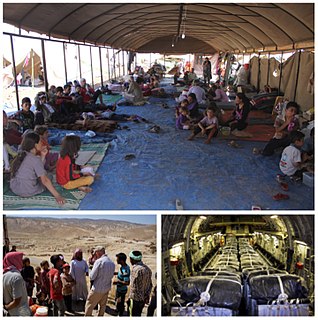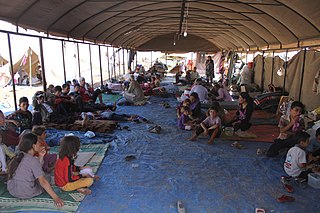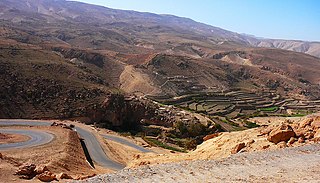 W
WThe Sinjar offensive was a combination of operations of Kurdish Peshmerga, PKK and People's Protection Units forces in December 2014, to recapture regions formerly lost to the Islamic State of Iraq and the Levant in their August offensive.
 W
WThe November Sinjar offensive was a combination of operations of Kurdish Peshmerga, PKK, and People's Protection Units forces in November 2015, to recapture the city of Sinjar from the Islamic State of Iraq and the Levant. It resulted in a decisive victory for the Kurdish forces, who expelled the ISIL militants from Sinjar and regained control of Highway 47, which until then had served as the major supply route between the ISIL strongholds of Raqqa and Mosul.
 W
WThe Islamic State of Iraq and the Levant (ISIL) is recognized by the United Nations as the perpetrator of a genocide of Yazidis in Sinjar, Iraq. The genocide led to the expulsion, flight and effective exile of the Yazidis from their ancestral lands in Iraqi Kurdistan. Thousands of Yazidi women and girls were forced into sexual slavery by the Islamic State, and thousands of Yazidi men were killed. Five thousand Yazidi civilians were killed during what has been called a "forced conversion campaign" being carried out by ISIL in Northern Iraq. The genocide began following the withdrawal of the Kurdistan Regional Government's Peshmerga. which left the Yazidis defenseless.
 W
WThe state of human rights in the Islamic State of Iraq and the Levant (ISIL) is considered to be one of the worst in the 21st century, and has been severely criticised by many political and religious organisations, and individuals. Islamic State policies included severe acts of genocide, torture and slavery. The United Nations Commission on Human Rights has stated that the Islamic State "seeks to subjugate civilians under its control and dominate every aspect of their lives through terror, indoctrination, and the provision of services to those who obey". ISIS actions of extreme criminality, terror, recruitment and other activities has been documented in several regions worldwide, including countries in the Middle East, Africa, Asia, Europe and America.
 W
WThe Islamic State of Iraq and the Levant, also known as the Islamic State of Iraq and Syria, officially known as the Islamic State (IS) and also known by its Arabic acronym Daesh, is a militant Islamist group and a former unrecognised proto-state that follows a fundamentalist, Salafi jihadist doctrine of Sunni Islam. ISIL was founded in 1999 by Jordanian Salafi jihadist Abu Musab al-Zarqawi under the name Jama'at al-Tawhid wal-Jihad and gained global prominence in early 2014 when it drove Iraqi government forces out of key cities in its Western Iraq offensive, followed by its capture of Mosul and the Sinjar massacre.
 W
WThe Last Girl: My Story of Captivity, and My Fight Against the Islamic State is an autobiographical book by Nadia Murad in which she describes how she was captured and enslaved by the Islamic State during the Second Iraqi Civil War. The book eventually led to the 2018 Nobel Peace Prize being awarded to Murad.
 W
WThe Sinjar massacre marked the beginning of the genocide of Yazidis by ISIL, the killing and abduction of thousands of Yazidi men, women and children. It took place in August 2014 in Sinjar city and Sinjar District in Iraq's Nineveh Governorate and was perpetrated by the Islamic State of Iraq and the Levant (ISIL). The massacre began with ISIL attacking and capturing Sinjar and neighboring towns on 3 August, during its Northern Iraq offensive.
 W
WQuasi-state-level jihadist groups, including Boko Haram and the Islamic State of Iraq and the Levant, have captured and enslaved women and children, often for sexual slavery. In 2014 in particular, both groups organised mass kidnappings of large numbers of girls and younger women.